Daifuku
I first encountered daifuku at one of my favorite restaurants in Western Massachusetts, Fresh Side. In their deli case were these cute little white and green pillow-looking desserts, sitting behind a hand-written card that said: Mochi (vegan).
I ordered one and when I bit into it, it was such a surprise. First, the texture! It’s like a dense marshmallow, chewy and soft. Sweet, but not overwhelmingly so. Next, the filling. Beans. Beans? Beans. This particular mochi was fillied with a sweetened red bean paste, also called anko, and I think it was the first time I had ever had sweet beans. And it was really good!
Now, if I understand correctly, mochi is a catch-all term for a sweet dessert made with glutenous rice flour dough. It can be baked, wrapped around ice cream, eaten plain, or filled. Filled mochi, like the ones I’m blogging about today, are called daifuku.
Anko is one of the most common fillings, but many people also use berries. Strawberry filled ones are very popular in the spring, and they’re called ichigo daifuku. Whole raspberries also work, and sometimes people include a white sweetened bean paste (as opposed to red) known as shiroan.
Now what if I told you that I made these in the microwave?
I know!
Really.
I was skeptical, too. The microwave in my house is pretty much reserved for reheating leftovers. When I decided to make these, I was sort of shocked that all the recipes online called for nuking the dough. What’s more, they were pretty unclear about how to tell when you’re dough is ready. Microwaves seem to vary so much in power, 3 minutes in one microwave is very different than 3 minutes in another. But I decided to give it a go, and not only did it work, but it was really, really easy. If you are able to find pre-made red bean paste, you can make this whole recipe with only a microwave and just a few minutes.
So not only do you not need a kitchen for these (hello dorm-living vegans!), they’re also gluten free (hi celiacs!), soy free (hi soy…allergic lovelies!), fast (hi lazy people!), customizable (hi picky people!), and did I mention CUTE? Traditional colors are white, green, and pink, but food coloring isn’t required if it grosses you out. Matcha (green tea powder) is a natural and delicious flavoring that makes the mochi green.
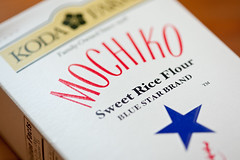 Now the one thing you absolutely need, no substitutions, is mochiko. It’s glutenous rice flour, and no other flour will work for this. You can find it easily at any asian market.
Now the one thing you absolutely need, no substitutions, is mochiko. It’s glutenous rice flour, and no other flour will work for this. You can find it easily at any asian market.
Also make sure you have some cornstarch or potato starch handy, the dough is very sticky!
Daifuku
Makes 10-12 Filled Cakes
1 Cup Mochiko
1/4 Cup Sugar
2/3 Cup Water
2-3 Drops red or green food coloring, optional
Cornstarch or Potato Starch, for dusting
Filling Ideas
Anko (store bought or recipe below)
Strawberries
Raspberries
Anko
Makes enough for 3-4 batches of daifuku
1 14 oz Can Adzuki Beans
1/2 Cup Water
1 Cup Sugar
1 Tbs Vegetable Oil
1-2 Pinches Salt
Heat water and sugar separately until boiling and sugar is dissolved, turn off heat. Drain and rinse beans.
Add to a pan and mash. Add 1/3 cup of the simple syrup you just made, along with salt and vegetable oil, and mash over medium heat. Beans will thicken and become slightly glossy. Add more syrup if desired. Turn out into a bowl and let cool.
Making the Mochi
Add the mochiko, sugar, water, and food coloring (if using) to a microwave safe bowl. Stir well, making sure there are no lumps. Scrape down the sides of the bowl as best you can with a rubber spatula, otherwise they’ll get all gross when the dough is microwaved.
Cover lightly with plastic wrap and mircowave for 2 minutes. Remove bowl from the microwave and stir VERY well. Dough will be much thicker, but there should still be some raw parts underneath. I like to use a sturdy silicone spatula to mix the dough at this point. Place the dough back in the microwave for 1 more minute.
Open the door and peek–did the dough start sinking as soon as the door opened? If so, the dough was inflating while cooking, which means it’s ready. If not, microwave for 1 more minute and check again. You shouldn’t have to microwave for more than 4 minutes total (2 minutes initial cooking, 2 more additional minutes after mixing).
One the dough deflates when you open the door, remove the dough from the microwave and scrape it out onto a cornstarch-coated cutting board.
Pat the hot dough (be careful! It’s hot!) with cornstarch and flatten it out a little. Cut into 10-12 even pieces. Add 1 tsp of filling to each piece and gently press the edges together to seal.
Here’s the whole process in a little HD video for you to watch! No sound, so don’t worry about turning down the volume if you’re at work. The video starts right after I took the dough out of the mircowave and dumped it onto the cutting board.
Making Daifuku on Vimeo.
The best way to keep these fresh is to individually wrap them in plastic wrap and then refrigerate. If you leave them out, unwrapped, they’ll get dry and tough. Enjoy!
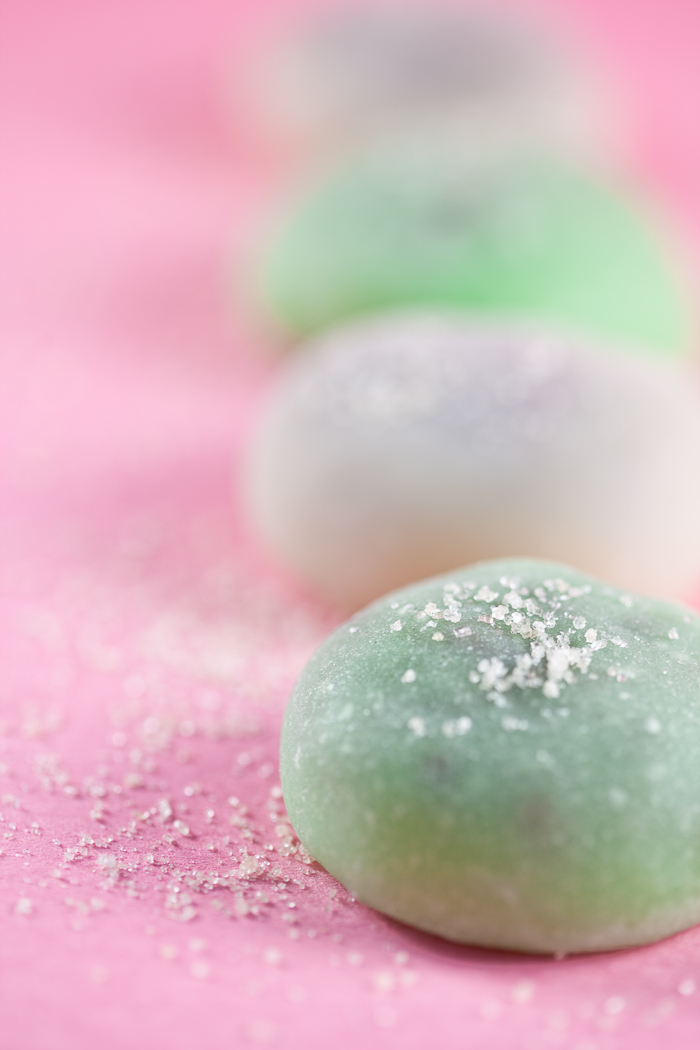
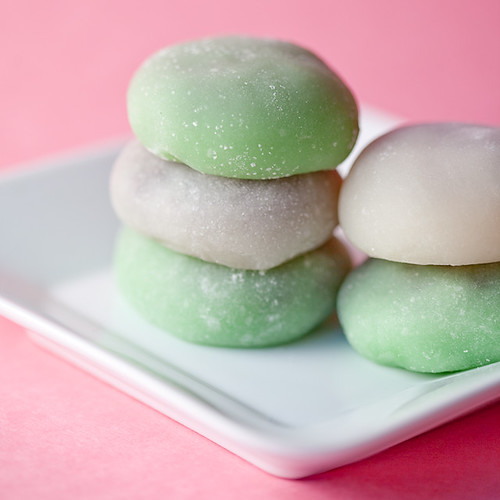
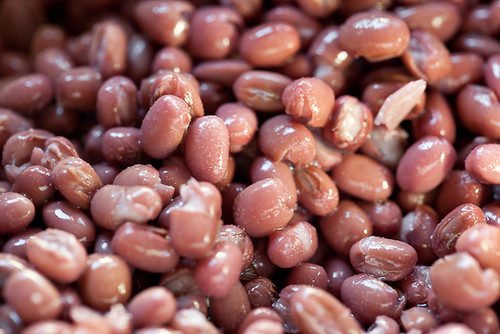
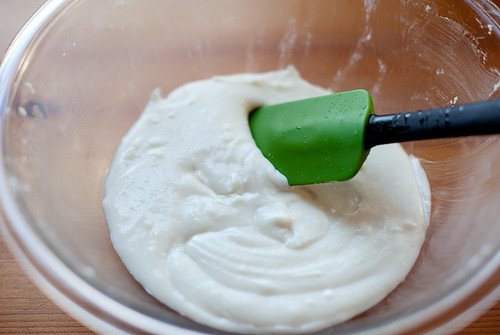
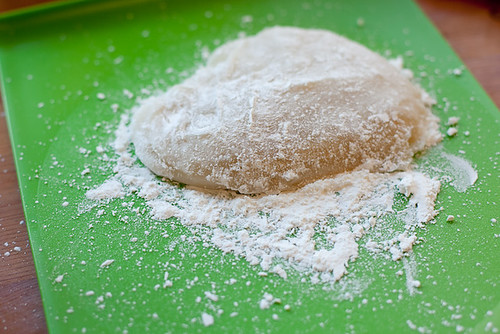
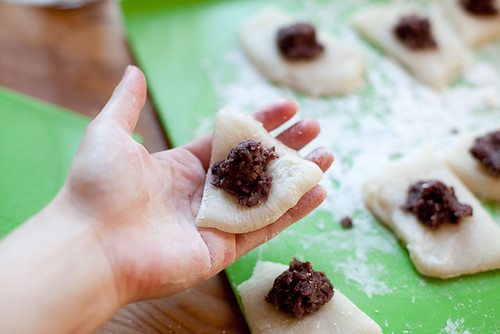
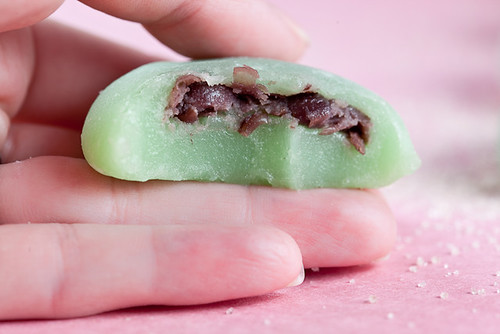
I can’t wait to try this – I absolutely love anything with red bean paste, and these look so adorable and cute and delicate – beautiful photos!!
The video looks great!!
These are so cute. I didn’t know how easy they were to make. My mom put sugar in my beans to get me to eat them when I was little, so I’m sure I’ll love these.
Hi. I love mocchi! Awesome pictures and instruction. I can’t wait to try it!
I love that you made mochi! In Hawaii that’s the very first thing we made in home ec class, in fact I think everything we made was in the microwave. I don’t really like the bean paste, my favorite mochi filling is ice cream. I’m not vegan so I don’t know if there’s a good vegan ice cream but you might want to try that. You just have to prescoop the little balls of ice cream and freeze them really hard, then freeze again as soon as you get the mochi wrapped around it. So good!
These look so adorable! And yet another easy to follow recipe – brilliant!
OMG! I adore Fresh Side! And I go to Amherst College! Wow I can’t believe you’ve visited the area!! (For some reason this online coincidence is very exciting to me, if you couldn’t tell).
Great post. I also enjoyed one of their daifuku mochi the other day and it was as good as I’ve had in Japan. One correction, though: daifuku means “great luck,” but only describes the red bean-filled mochi. The others are usually just called strawberry mochi or chocolate mochi – you get the idea. And you’re quite right about the Mochiko; all the Japanese recipes I’ve read call for it, without substitutions.
I’m so glad you tried the microwave version because I went through the trouble of steaming it and making a huge mess (and blogging about it too), so it’s good to hear the microwave does a great job in about 1/10th the time.
Wow, still very cool to know you have been to Fresh Side. And if you’re ever in the area, hit me up!
Hey Chris! I graduated from Mount Holyoke in 2005, so I spent four years living in the pioneer valley, and I miss it! I’ll probably be back there for web comics weekend, so if you’re going, let me know! I’ll definitely be stopping into fresh side for pad thai. And thanks for the clarification on the daifuku/mochi point. :) Take care!
Oh! I didn’t know they have those at Fresh Side! Yum!
I made them with mango and tea over the summer: http://www.heythattastesgood.com/2008/09/mochi.html
I’ve gotten them in Chinatown filled with peanuts and covered in coconut, but my favorites are the big ones filled with fresh juicy mango. Yuuuuuum.
aww man, I was so excited to see you tweeting about this – but I don’t have a microwave! I’m checking out the steamed version over at Beyond Ramen, but it looks kind of messy. Good thing I live around the corner from a local market that carries these. So tasty and light!
Mmm, this is so cool! I love the pastel colors =)
Thanks for the recipe. I’m always looking for new ways to use adzuki beans! I didn’t know about Fresh Side and look forward to checking it out when I’m next in Amherst. Do you know about Tofu A Go-Go in Greenfield, MA? It’s my favorite restaurant in Western MA. Well, that and Hope & Olive, but Tofu us 100% vegetarian. Check them out!
I love that you included a video! So helpful! I might make these this weekend…
When I make mochi, I also use the microwave, but I learned from my dentist ( who is Japanese-American ) to use a silicone bundt pan to make the mochi easier to release and cut into individual pieces. Your’s look GREAT. All your stuff always look great. I just noticed that you are on a Japanese food kick. Tempura, then mochi…..I wonder what’s next.
Ooh, I love the mochi squares! And I’m a huge fan of anything stuffed with sweet red bean paste. I’ll look for that flour when I’m at the Viet Hoa (my local Asian grocery) next time!
Oooo. I like the video.
I absolutely love the video! Great thing to incorporate with photos.
I love your blog!
I thoroughly enjoyed this post! The lovely images (great colors and lighting!), wry humor (“Hi celiacs!”), and instructional video combined to make a fine blog reading experience and very informative post.
Mahalo! :) CQ
Whenever I got home to visit my parents in FL, I go to a little place called Faith and Chocolate that sells these with ice cream in them. They’re called Bubbies, and I would give anything to be able to find them here. I LOVE the mochi part of the dessert, and am so excited to have found a recipe for the outside.
Do you happen to know a site that would describe how to do these with ice cream? Or something similar? I’m not a vegan so I’m not concerned necessarily with whether it is “real” or soy ice cream.
Thanks so much for this!
Hi Ashly! I’d fill them the exact same with for ice cream. Use a melon baller to scoop the ice cream, fill the mochi, then put the filled mochi back in the freezer until you’re ready to eat!
I’m from western Mass and go to that restaurant all the time. How weird! Next time you’re in western Mass, check out Cafe Evolution in Florence (about 15 mins from Amherst)… it’s completely vegan and has everything from super fancy entrees to nachos to amazing deserts and pastries (Sunday brunch is my favorite).
This is one of my favorite treats, ever. Thanks for the recipe. Is there a way to do it without the microwave? (Steaming?)
Wow, this is so interesting! I am definatly for exotic flavors (I personally believe many vegans are more daring when it comes to their food, horray!) such as matchta, but never have I tried a sweet bean cake- filled with anko and berries!? So cool! These are so pretty and simple… could you get the gluten rice flour at a healthfoods store or whole foods? Thanks, great recipes as always! :)
Sounds good, but no microwave. Is stovetop an option?
Mmmm… this brings me delicious childhood memories.
I know its not even close to the same, but it reminds me of the shave ice they sell in hawaii with the adzuki beans on the bottom.
oh my god! i was just trying to figure out how to veganize these the other day. i love them! thank you so much for the recipe!
thanks so much for the video – they really help me out a lot. i’ve never even heard of these things before, but i’m quite excited to try them!
thanks for all the beautiful recipes, btw – i check back almost every day, but i never post a reply… just wanted you to know that you have yet another dedicated fan :)
Mm, never thought of using ice cream for this.. sounds good. :)
To the sans-microwave people:
My grandmum makes varieties of these for breakfast (called kueh). but she doesn’t cook the dough first – she mixes the dough, pats out and fills each kueh/daifuku, then steams them.
She uses a bit of warm water to make the dough, so (if I remember right) the dough is still kind of raw when she puts the filling in, and not quite as sticky as it would be if you had already cooked it (so maybe it’s easier to work with? Not sure — maybe Lolo already tried this way though, and it doesn’t work as well?)
To cook them, she puts them on a lightly oiled plate and steams them in a wok for ~8 minutes or so. They come out glistening and delicious. :)
Re-steaming also works if they are a bit dried out, or if you want to heat them up again. I think they get a bit tougher if you resteam them multiple times but they still taste good… serious!
I guess this method would not work so well with ice cream filled daifuku though… :(
This is amazing! I love mochi, especially in ice cream. This looks so easy to make! thanks for the inspiration.
Oh thank you! I love these to and I haven’t had any in almost 10 years. Can’t wait to try the recipe!
oh i really wish i liked these, they are so cute, but i just can’t handle the texture. my friend described them as a cross between an earlobe and a… part of a guy’s anatomy begining with s… and i just can’t get that image out of my head!
ps i’m so sorry for sharing that with you!
I had mochi once at a sushi bar in california, and have been curious about making them ever since. Thanks for the recipe, it looks terrific!
OMG I had to come out of lurkland to thank you! I’ve been wanting to learn how to make red bean and mochi is so yummy. I’m going to make this, like tomorrow!
Whoo hoo!
Oh I’ve made several of your recipies, they all come out so wonderfully!
What a super fun post. I love the pictures and the descriptions for how these can fit into various lifestyle. Precious!!!
Cheers,
Kristen
My favourite filling for these is black sesame paste…oh it’s lovely! I think I’m gonna have to go get some after work now…
Also, for those of you who don’t want to sweeten adzuki yourself, you can buy prepared anko in cans or pouches at an Asian grocery. (Both mashed and whole.) Some people will eat just that with ice cream.
I have never liked anko (my parents love it) but I love mochi… and I was sad to find that ichigo daifuku do have anko in them as well, but it’s okay cause the strawberries are so good. XD
I end up eating kinako mochi and the like a lot, since I’m just not a fan of filled mochi. (Also, where I’m from (the Hokuriku region), we don’t refer to all filled mochi as daifuku. Some we just refer to as “mochi”… but I’d be hard pressed to tell you where the line’s actually drawn.)
If you make mochi a lot, a mochi maker is actually pretty awesome. Put in the mochi rice and water, and later you have fresh mochi! Great for New Year’s.
Also, you MUST try mochi broiled. Take a hunk of mochi (I’d say around half an inch thick) and either grill it or broil it in a toaster oven. It’ll puff up, when it gets golden it’s done. Eat with sweetened soy sauce or whatever else you desire. Man, now I’m making myself hungry.
Yes! I used to live in Japan and these (along with ichigo daifuku – frozen strawberry covered in ice cream and wrapped in mochi) were my favourite convenience store snack! I’ve checked at my local Japanese store here in London and the commercial ones all have gelatine or other non-veg ingredients so I haven’t eaten these in years. I’m definitely going to try making them after your post!
As far as I know ‘mochi’ refers to the rice and is traditionally cooked and pounded in a wooden drum at the annual mochizuki festival. The sweets themselves are also called mochi. I distinctly remember attending the festival in my little rural Japanese town and even giving a speech! All the children of the town were there and we made and ate anko mochi and also another flavour that was covered in a brown powder – I forget the name. We didn’t make it but black sesame mochi was also a favourite!
Question: “they’re also gluten free (hi celiacs!)”
glutenous rice flour? how are they gluten free?
Leslie, below, is right! It’s not actually gluten in the rice, it’s just called glutenous to denote the fact that it’s sticky.
Re: snerfu…it’s the quality of the rice – it’s “glutenous.” Very gooey, sticky rice that likes to hang together. No actual gluten, though!
I love the pastel colors. The owner and manager of a store I used to work at were both Korean, and they would frequently bring in treats that were filled with red bean paste. It’s so tasty! I never thought of making it myself, but I clearly should since it’s so easy.
Oh my goodness I LOVE mochi! I’ve eaten something similar to this in Hawai’i.
I’ve been watching your blog for about a month now and it’s the only blog with recipes I TRUST. Every other vegan recipe I’ve tried has turned out tasting like carob flavored cardboard.
Veux-tu m’épouser? ;)
I love daifuku and have been making it for months based off recipes off the web. It’s so quick and easy that it’s what I generally make when I’m craving a sweet. I’m going to try your method of pressing then cutting the dough. It looks a lot easier than what I currently do, which is try to free a glob of dough from the spoon for each daifuku.
Love the pics!
Those came out perfectly. They look like a fun Easter treat with the colors. Must try.
Aside from the deliciousness factor, these are, perhaps, the most pillowy desserts I have ever seen! Adorable!
I’m so going to make these this weekend! Thanks for the simple recipe. What a great sweet snack to have out for guests!
i love how the cute little mochi look against the pink background! yay for cute treats.
They’re adorable! :) I do like the sweet red bean paste, haven’t had any for ages.
I used to eat those all the time as a child, and another type with the same bean filling, but a different dough, less chewy. It’s lovely, thanks for sharing the recipe, and for bringing back childhood memories for me…
my boyfriends mother buys these at the korean market all the time… arent they amazing!
Your video is a great addition to this recipe. Thank you.